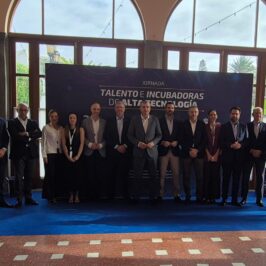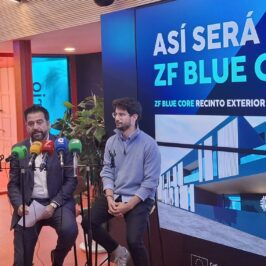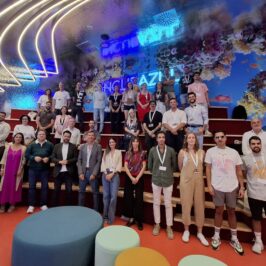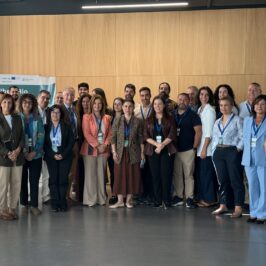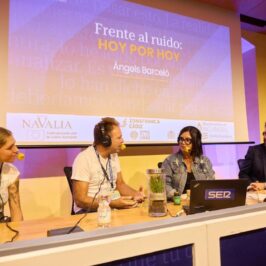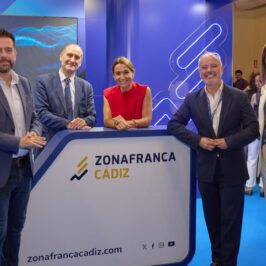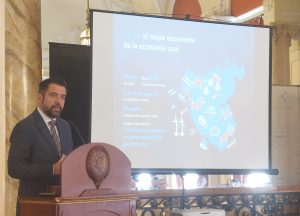 The Consortium delegate, Fran González, presented the strategy of the Cádiz Consortium at the conference organized by the Clúster Marintimo español at the Real Casino of Madrid
The Consortium delegate, Fran González, presented the strategy of the Cádiz Consortium at the conference organized by the Clúster Marintimo español at the Real Casino of Madrid
The incubator developed by the Free Trade Zone, Incubazul, with the complete acceleration program through which 80 startups have already gone through, has captured great interest among attendees
The Bahía de Cádiz is visible as the great Economí hubto Azul de España in a meeting attended by an important representation of the sector, both business and institutional
The Cádiz Free Trade Zone has claimed today in Madrid the new industrial model based on innovation and the Blue Economy that is redefining the economic context of the province at a breakfast in Madrid organized by the Spanish Maritime Cluster. The special delegate of the State for the Free Zone of Cádiz has presented to an important representation of the sector the projects of the institution and its new model of industry 4.0, an innovative and sustainable industry, responsible and committed to the environment.
The meeting, which was attended by the president of State Ports, deputies, senior officers of the Navy and the Civil Guard and representatives of the productive fabric around the blue sector, was presented by Javier Garat, president of the Spanish Maritime Cluster , an organization to which the Cádiz Consortium joined last month and which brings together all the industries, services and economic activities of our country related to the sea and which seeks to establish allies and seek synergies for collaboration and cooperation among all those Spanish activities linked to the sea.
The State delegate in the Cádiz Free Trade Zone, Fran González, has explained at the Madrid forum the basis of the Blue Economy strategy that has allowed us to look back at the industry as the basis of the province's economy, which already depended on this sector historically, but with the perspective of the blue economy, which is not only an identified way of generating wealth and attracting talent, but also a responsibility towards maritime systems and sustainability.
During the talk, González also explained the projects that the Free Trade Zone is currently carrying out, in addition to offering a detailed explanation of the activity of the Cádiz tax institution, in whose facilities 350 companies already operate. Seventy-five of these companies, which employ 1,500 people, are linked to the Blue Economy, a fundamental axis on which the industrial model implemented in the Consortium is based, a model that is promoting the attraction of innovative companies, which already reach a total of 23 only in the tax precinct of Cádiz.
With 2.5 million of industrial land, presence in 12 municipalities of the province, two tax precincts and more than 3,500 direct and 7,200 indirect jobs, the Cádiz Free Trade Zone is consolidating itself as a true engine of development and with its new industry model focused on the Blue Economy is promoting the Bay of Cádiz to become the great hub of the Blue Economy in Spain.
Fran González explained that in a province like Cádiz, historically linked to maritime activity, “we have turned our gaze again to the sea but with different eyes, with the eyes of respect and commitment to the environment” and has offered precise data on the Blue Economy sector, which represents 5% of the world's GDP and offers employment in Spain to almost a million people.
In the exhibition he pointed out Incubazul as the nucleus of everything that is moving in the blue economy in the province. “Our Blue Economy incubator, Incubazul, houses 80 startups, whose activity ranges from sustainable tourism to biotechnology, including sustainable fashion, aquaculture or the reuse of algae, and a third of them are already making a profit,” he said. said the person in charge of the Cádiz Consortium.
Fran González has presented the scenario that the province of Cádiz represents for the Blue Economy, a scenario with immense potential that has a consolidated ecosystem in the sector and with a Free Trade Zone that is leading the new industry 4.0, innovative, sustainable model. and committed to the environment. Entities such as the University of Cádiz, with its Faculty of Marine Sciences and the CEI-Mar, Navantia or the Naval Maritime Cluster of Cádiz, among others, form an ideal scenario for the development of projects linked to innovation and the Blue Economy.
Everyone knows that the province of Cádiz is a benchmark in tourism - also in sustainable tourism -, in gastronomy and in aquaculture. Cádiz is at the head of Andalusia in the aquaculture field, bringing together 60% (78) of all the facilities or production units authorized in Andalusia (131). Furthermore, 70% of the employment generated by marine aquaculture in the autonomous community (937 jobs) is located in this province, since Cádiz companies have 650 people on their payroll.
The delegate of the Free Trade Zone concluded by encouraging attendees to get to know the Free Trade Zone of Cádiz and Incubazul, the equipment, the strategic situation and the interesting projects and ideas that are part of the incubator's acceleration program and that is being brought to shine the light on the enormous talent that exists in Andalusia.
Fran González has pointed out that the presence of the Cádiz Free Trade Zone in Madrid is of great value because "it gives visibility to the work we are doing and offers us the possibility of bringing the Cádiz brand to the capital." The delegate has highlighted the importance of being part of the Cluster, which we thank for offering us the possibility of telling what we do in forums like this, which allows us to develop contacts and share synergies with its members."
González has stressed that “the connection of the Cádiz Consortium with the sea, maritime traffic and international trade has been present since its creation 95 years ago and its incorporation into the Spanish Maritime Cluster will allow the existing ecosystem to be enriched, already in itself. powerful, establishing allies for collaboration and cooperation between all those activities linked to the sea.”
The Spanish Maritime Cluster has been operating since October 2007, the date on which the founding act was signed and the statutes were approved. This entity includes activities such as maritime transport; shipbuilding and repair; maritime engineering and auxiliary industry; extractive fishing and marine aquaculture; the recreational nautical industry, marinas and marinas; energies of marine origin; the army; ports and port services; maritime services, as well as regional clusters; marine research; the agents of the R&D&i system; training organizations; unions and professional associations; culture, heritage and social well-being.




